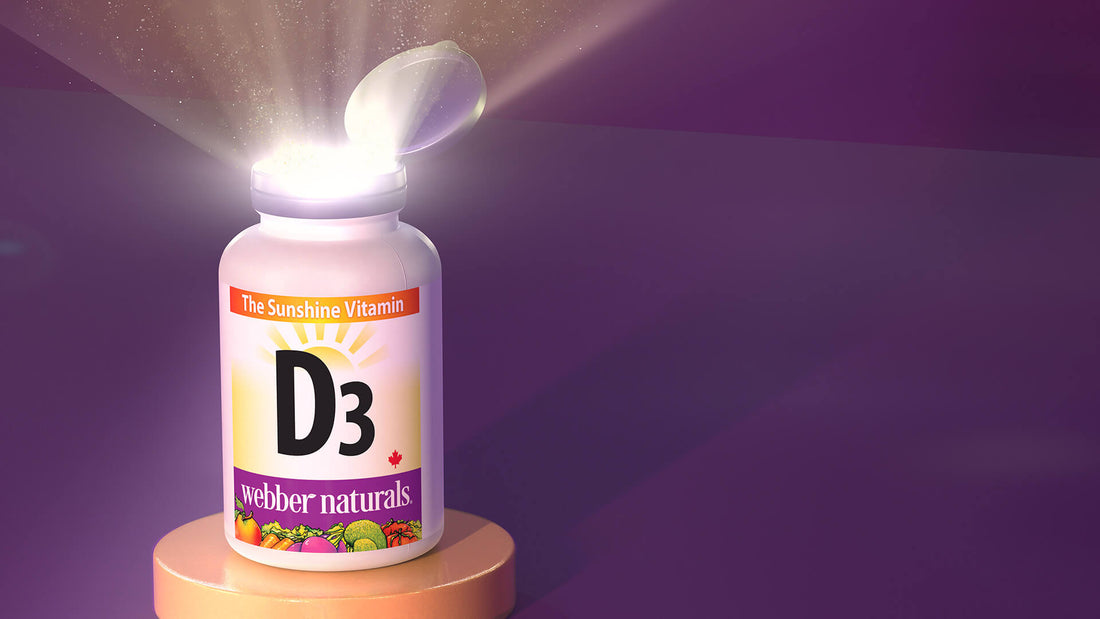Read Time: 3 min | Categories: Vitamin D | Body Health
Do You Need Vitamin D Supplements in Summer?
Webber Naturals
Share this article
As you enjoy spending time outdoors in the summer sun, you might think you’re getting all the vitamin D you need. But is this really the case?
First, let’s dive into vitamin D sources
There are two major forms of vitamin D: D2 and D3. Vitamin D2 is found naturally in some foods, such as wild mushrooms, in foods that are fortified with vitamin D2, as well as most vitamin D supplements. Vitamin D3, on the other hand, comes from sun exposure, foods such as fish and egg yolk, foods that are fortified with vitamin D3, and vitamin D3 supplements. In this post, we’ll dive deeper into Vitamin D3 intake from the sun. For further reading, check out our post: Why Vitamin D is Important.

Vitamin D3 is the best form to take as a supplement, as it is in its active, most usable form. Studies show that though vitamin D2 and D3 are used by the body in the same way, vitamin D3 is more effective at increasing vitamin D levels in the body [1].
What does vitamin D do?
Vitamin D plays an important role in helping the body absorb calcium for healthy bones and teeth. Vitamin D also supports the immune system to defend the body against viruses and bacteria. For these reasons, it’s important to keep healthy levels of vitamin D year-round.
How much vitamin D do you need on a daily basis?
The amount needed varies from person to person and with other factors such as age or if you are pregnant. We’ve outlined some of these other factors below. It should be noted that Health Canada’s recommended dietary allowance for anyone over the age of nine is 600 IU [2]. However, some research indicates this amount should be increased to at least 1000 IU for adults [3, 4].
Several factors affect how much vitamin D you actually get from the sun:
- How far you live from the equator. Because of Canada’s distance from the equator and the angle of the sun, Canadians don’t get much sun exposure outside of the summer months.
- Time you spend outdoors and the time of day you’re outside. The best time to get vitamin D from the sun in Canada is between the hours of 10 am and 2 pm, for 20–30 minutes per day.
- Cloud cover and smog. These block the sun, which affects your UV exposure – something the skin needs to make vitamin D.
- If you’re wearing sunscreen. Sunscreen can reduce the amount of vitamin D you get from the sun, but it is important that you wear sunscreen outdoors to reduce the risk of skin cancer [5].
-
The pigment in your skin, known as melanin. Melanin protects your skin from UV rays. The more melanin you have, the less vitamin D you absorb from the sun.

Should you continue taking your vitamin D supplement?
The short answer is yes. “You’d benefit from taking it year-round,” says naturopathic doctor, Joyce Johnson. “If you’re not outside much without sunscreen during those peak hours, you should continue your supplement use.”
If you’ve integrated a vitamin D supplement into your daily routine, there is no reason you should stop taking your supplement during the summer. In addition, since most foods contain only minimal amounts of vitamin D3 and D2, it’s difficult to get the amount of vitamin D you need from diet alone. For example, you'd need to eat nearly 2 lb of sardines in order to get 400 IU of Vitamin D. That’s a lot of sardines to eat in one day!
If you haven’t started taking a vitamin D supplement, it’s never too late to start, with the vitamin available in many different forms such as softgels, tablets, and even gummies. It’s now easier than ever to get your daily vitamin D needs met with Vitamin D tablets and softgels from Webber Naturals, now available in 2500 IU.
Click here to view the complete list of vitamin D supplements from Webber Naturals.
